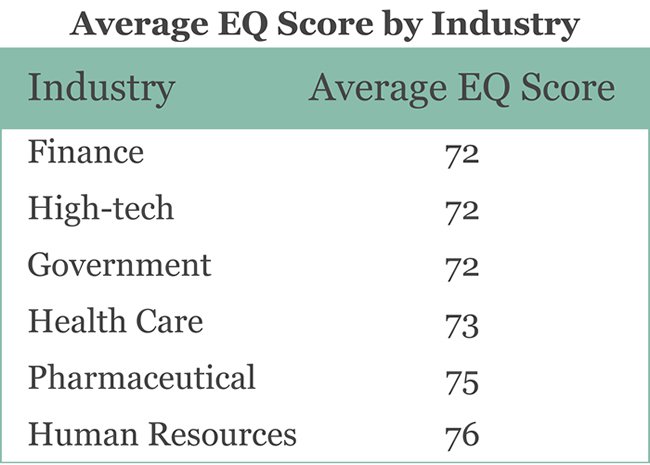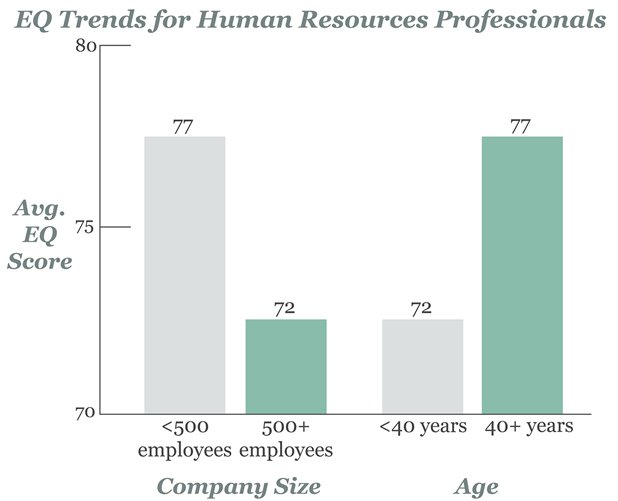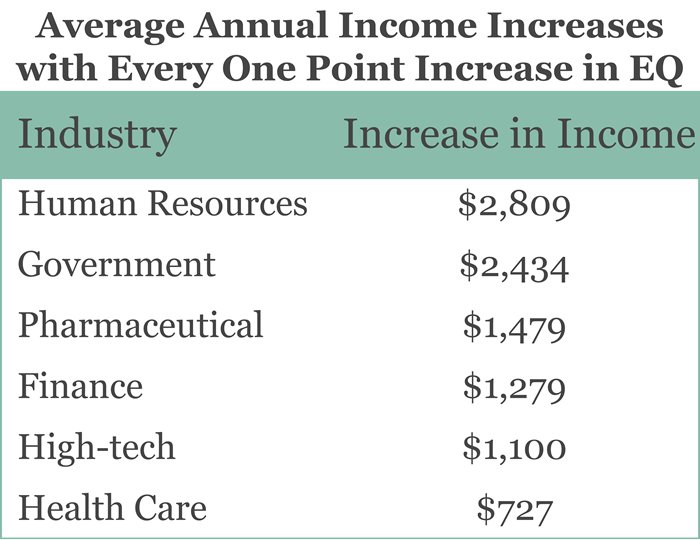Rolling Stones guitarist Bill Wyman was once asked, “What is the question you get asked the most?” Wyman replied, “That’s the question I get asked the most.” At TalentSmartEQ®, the question we get asked the most is simple: “What is considered ‘normal’?” The question is usually phrased, “What are the average emotional intelligence scores in my industry?” Though TalentSmartEQ® has a huge normative database, most people want to compare apples to apples. They want us to drill down and compare their EQ scores to those of people just like them.
So, by popular demand, here is a 2010 snapshot of the numbers we see overall and the important trends for key industries, including specific findings for professionals working in the human resources profession.
Workplace Trends in Emotional Intelligence
Overall EQ Trends
- 90% percent of top performers are high in EQ. Working professionals that rated high on performance also rated high on emotional intelligence. There are those notable exceptions, but don’t let the stories fool you. Only 10% of top performers in our database score low in EQ.
- Just 20% of low performers are high in EQ. This may be intuitive, but it is still worth noting.
- EQ alone explains 58% of a leader’s job performance. This may seem surprising but can be explained by a few key factors. Before landing C-suite promotions, these leaders have already passed a significant screening process that eliminates wide variability in the people selected for leadership roles. Factors such as education, expertise, and years of experience begin to look very similar for people in similar positions in the same profession. How people conduct themselves and what they can accomplish through others, however, is what makes the real difference. It’s their EQ skills, not IQ, which make a significant difference in their job performance.
- Average EQ is 75. Across all industries and professions, the average EQ score people receive on the Emotional Intelligence Appraisal® is 75 on a 100-point scale.
EQ Trends By Industry
- Average EQ in selected industries varies but not widely. The table below lists the average EQ scores for professionals working in selected industries.

- Reported income increases as emotional intelligence scores increase. Average reported annual income levels increase at each EQ score level. This notable step up in income for people with higher EQ scores happens across industries. This just may be the case for developing emotional intelligence that you’ve been waiting for.
More Trends For Human Resources Professionals
After attending human resources and other related conferences this year, we noticed that HR professionals expressed a particular interest in EQ–so we decided to take a closer look at what EQ looks like within the HR industry. After analyzing the industry data, we found notable EQ trends:
- HR has the highest average EQ score among the industries reported (Avg. EQ = 76).
- HR has the largest annual income increase as EQ scores go up ($2,809 per one point of EQ). Even company size, age, EQ skill, and job level matter in specific ways for human resources professionals.

- HR teams in big companies could use a little EQ help. HR professionals working at companies with more than 500 employees score lower (Avg. EQ = 72) than those working at smaller companies (Avg. EQ = 77).
- Younger HR professionals could develop their EQ. HR professionals under 40 years old display lower EQ (Avg. EQ = 73) than those 40 years old and older (Avg. EQ = 78).
- HR professionals need to self-manage. Within the HR industry, scores are highest in social awareness but lowest in self-management, one of the EQ skills critical to job performance for professionals working in human resources.
- HR leaders can develop their staff’s EQ. HR staff, supervisors, and managers score significantly lower EQ (Avg. EQ = 73, 74, and 70, respectively) than upper-level HR executives (Avg. EQ = 79). The good news is EQ skills can be developed, and HR leaders are poised to do just that. One great place to start is to measure EQ using the Emotional Intelligence Appraisal®, which can be used for an EQ development program or a topic of discussion for a one-on-one coaching session.
ABOUT THE AUTHOR:
Jean Greaves, Ph.D.
Dr. Jean Greaves is the co-author of the bestselling Emotional Intelligence 2.0 and the cofounder and CEO of TalentSmartEQ, the world’s leading provider of emotional intelligence tests, emotional intelligence training, and executive coaching. Her bestselling emotional intelligence books have been translated into 25 languages and are available in more than 150 countries. Dr. Greaves leverages her twenty-five year track record of consulting, speaking and applied research. She has written for, or been covered by, Newsweek, Fortune, Forbes, The Wall Street Journal, The Washington Post, and The Harvard Business Review.
